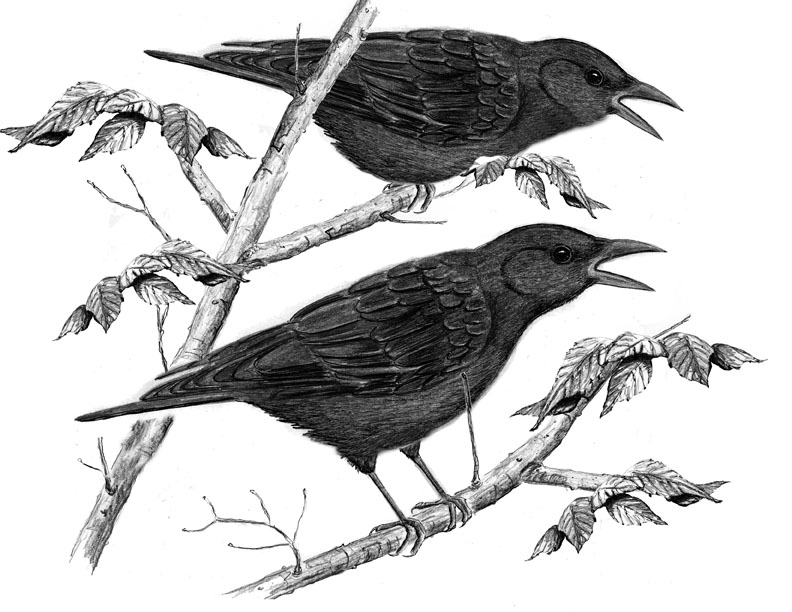
Dear Bird Folks,
Other than their usual “caw, caw, caw” racket, the crows in my yard also make a chuckling sound. When they do that are they laughing at me or does that sound have a more significant meaning? I looked for an explanation on a crow website but my old brain was immediately overtaxed by the lengthy list of recognized crow calls. So instead, I’m turning to you for the answer.
– Tom, Eastham, MA
No, Tom,
The crows aren’t laughing at you. Birds never laugh at anything. As much as I like birds, one of their principal character flaws is that none of them have a sense of humor. In fact, many birds, such as robins, look totally uptight, as if they have been eating too much cheese. Even my beloved chickadees never smile, not even when I tell my best jokes. Evolution may have given birds a wishbone, but not a funny bone. There is one exception, of course, and that’s the Laughing Gull. They think everything is funny. Maybe Laughing Gulls should be my favorite bird. I’ll have to think about that one.
It’s not your old brain, Tom. I don’t know how old you are, but even if you were fifty years younger, your brain wouldn’t be able to successfully sort through the endless number of calls the American Crow makes. Some authorities put the number of crow calls at twenty, but the real number might be higher than that. The vast majority of their calls sound like “caw,” but they also produce a varied assortment of other sounds. Over the years, scientists (well, mostly grad students) have spent a lot of time in the field trying to sort out all these sounds. Here is what they have found out. (FYI, it’s not very exciting.)
As I’ve just mentioned, cawing is the crow’s sound of choice. Their calls are broken down into short caws, medium caws, short-medium caws (really), long caws, harsh caws, and the list goes on. The overall tone and intensity of any given caw are the keys. I suppose crow-speak isn’t much different than they way we talk. For example: When I get home from work my wife may ask me, “Where have you been?” with a tone that implies that she missed me. Or, she might also say, “Where have you been?” with an inflection that indicates that I’m late and probably in trouble. (I get that last one a lot.) Did you understand any of that? Maybe a dog analogy might be better. From the tone of a dog’s bark, the owner immediately knows if, say, a friend is coming to the door, or if it’s someone trying to peddle something sinister, such as vinyl siding or religion. By using various inflections in their caws, crows are able to announce their territories, or scold an intruder, or call for help…and somehow the other crows know which is which.
I think I’ve mentioned this incident before, but since I don’t really remember doing it, I doubt anyone else will either. The crows in my neighborhood are a rowdy bunch. They are always yelling about something, but it’s mostly territorial chatter. Eventually, their cawing becomes background noise, like traffic sounds or a nagging partner. Early one morning I was lying in bed, probably trying to decide between having Cheerios or Froot Loops for breakfast, when the background cawing became much louder and more intense. I knew right away that something big was going down in the crow world. Still wearing my footie pajamas, I jumped up, ran outside and followed the sound to a grove of cedar trees in my neighbor’s yard. As I bushwhacked through the cedar branches the crows backed off and I came face to face with three Long-eared Owls. These handsome owls are rare on Cape Cod, so this was a very exciting discovery. After watching the owls for a few minutes, I thanked the crows for tipping me off and headed home, still in my footie PJs. I then walked into the house where my frowning wife was standing at the door saying, “Where have you been?” (I told you I get that a lot.)
While cawing (with different degrees of length and intensity) is clearly the crows’ sound of choice, they also make several non-caw sounds. Many times I’ve heard crows produce sounds that I swear were coming from some other creature or perhaps someone was playing a trick on me. These sounds include “g-wall-op,” cu-koos” and “kuck-woo-oops” (but don’t quote me). Then there is the soft rattle, or as you call it, the “chuckling” call. This sound has puzzled researchers for years and they are sure it means something special. It’s just too bad they can’t figure out what that specialness is. I’ve read several interpretations by numerous experts and none of them agree about what the rattle (aka, chuckling) call means. Some suggest that it’s a predator alarm, while others feel it is used when a crow is trying to join a new flock, and still others claim it is mostly given between couples. I’m not sure about that last one. I’ve tried that chuckling approach with my wife several times and so far she hasn’t been all that impressed.
It is clear, Tom, that while trying to communicate information to each other, American Crows can produce a vast array of caws, as well as other sounds. But what that information actually means isn’t nearly as clear…at least not to us. As far as the chuckling call goes, I don’t think it has anything to do with humor. So, don’t bother trying to reproduce it because no one will think it’s funny…well, no one except the Laughing Gulls. They’ll love it.